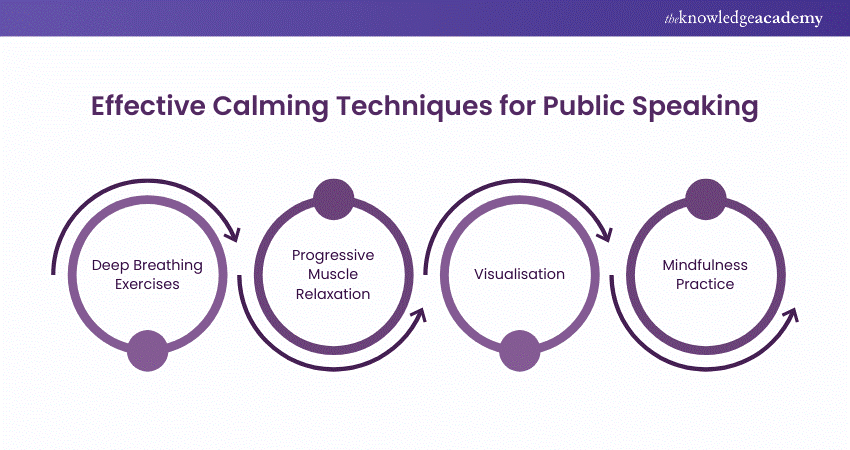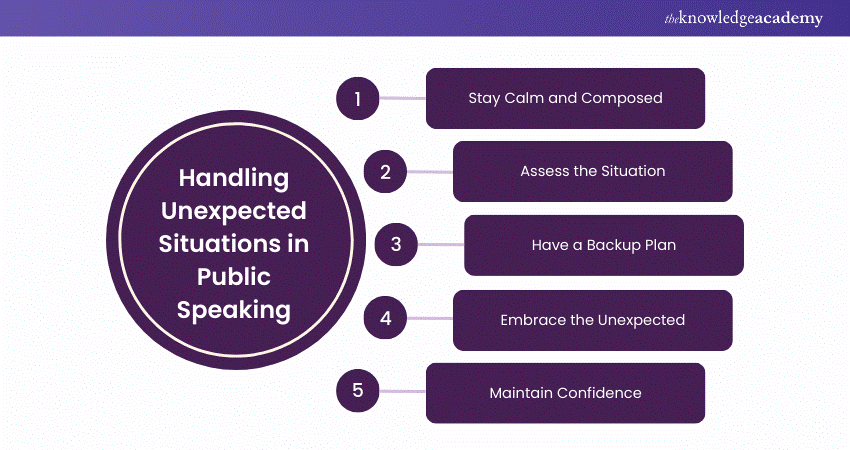We may not have the course you’re looking for. If you enquire or give us a call on 01344203999 and speak to our training experts, we may still be able to help with your training requirements.
We ensure quality, budget-alignment, and timely delivery by our expert instructors.

Ever felt your heart race, your palms sweat, and your mind go blank at the thought of speaking in front of a crowd? If so, you're not alone. Public Speaking is a common fear that can grip even the most confident individuals. However, learning How to Overcome Fear of Public Speaking isn’t just about calming nerves; it’s about unleashing your true potential.
In this blog will show you how to turn your fear into fuel. We’ll explore practical techniques, and mindset shifts that will help you master the art of Public Speaking. Discovering How to Overcome Fear of Public Speaking will empower you to stand tall, speak boldly, and truly own the room. Ready to conquer the stage? Let’s begin.
Table of Contents
1) What is Glossophobia: Fear of Public Speaking
2) How to Overcome Your Fear of Public Speaking?
a) Know Your Topic
b) Get Organised
c) Practice and Practice More
d) Try Some Calming Techniques
e) Visualise Your Success
f) Engage With the Audience
g) Deal With Unexpected Situations
h) Don't be Afraid of Silence
i) Build Confidence Through Experience
j) Seek Support
3) Conclusion
What is Glossophobia: Fear of Public Speaking
Glossophobia, commonly known as the Fear of Public Speaking, is an anxiety disorder that affects many people. This fear can manifest as intense nervousness, sweating, trembling, a racing heartbeat, or even nausea when faced with the prospect of speaking in front of an audience.
The fear stems from the worry of being judged, making mistakes, or embarrassing oneself. For some, it can be a mild discomfort, while for others, it can be a crippling phobia that hinders personal and professional growth. Overcoming glossophobia often requires gradual exposure, practice, and techniques to manage anxiety, such as deep breathing and visualisation.

How to Overcome Your Fear of Public Speaking?
Here are the tips to overcome your Fear of Public Speaking:
1) Know Your Topic
A deep understanding and genuine interest in your topic significantly reduce the chances of making mistakes or losing your way during a speech. If you do happen to stumble, your familiarity with the subject will help you regain your flow quickly and confidently.
Additionally, consider potential audience questions in advance and prepare thoughtful responses. This preparation not only boosts your confidence but also enhances your ability to engage with the audience, making your speech more impactful and effective.
2) Get Organised
Being well-organised is key to delivering a successful speech. Start by outlining your main points and structuring your speech logically. This will help you stay on track and ensure a smooth flow of ideas. Prepare any materials or visual aids in advance, and practice your speech multiple times to refine your delivery.
Organising your thoughts and materials will boost your confidence, reduce anxiety, and make it easier to convey your message effectively. By staying organised, you can focus on engaging your audience and delivering your speech with clarity and poise.
3) Practice and Practice More
The key to mastering Public Speaking is consistent practice. The more you rehearse, the more comfortable and confident you'll become with your material. Start by practising alone, then gradually involve friends or colleagues to simulate an audience.
Repeated practice helps you refine your delivery, manage your pacing, and reduce anxiety. It also allows you to anticipate potential challenges and adjust your approach accordingly.
4) Try Some Calming Techniques

Incorporating calming techniques can significantly reduce anxiety before and during Public Speaking. Start with deep breathing exercises to slow your heart rate and clear your mind. Progressive muscle relaxation, where you tense and then release different muscle groups, can also help ease physical tension.
Visualisation techniques, such as picturing a successful presentation, can boost your confidence. Additionally, practice mindfulness to stay present and focused. These techniques not only calm your nerves but also enhance your overall performance, helping you speak with clarity and confidence.
5) Visualise Your Success
Visualisation is a powerful tool to boost your confidence in Public Speaking. Take a few moments before your speech to imagine yourself delivering it flawlessly - see yourself speaking clearly, engaging the audience, and handling questions with ease.
Picture the positive reactions of your listeners, such as nodding in agreement or applauding at the end. This mental rehearsal can help reduce anxiety and prepare your mind for success. By visualising a successful outcome, you set a positive tone for your performance, making it more likely to turn your vision into reality.
Enhance your visual communication skills today- join our expert-led Visual Communication Course and transform your presentations into impactful messages!
6) Engage With the Audience
Connecting with your audience is key to a successful presentation. Start by making eye contact to create a sense of rapport and trust. Use open body language and move around the stage to draw in your listeners.
Ask questions, encourage participation, and respond to audience reactions to keep them involved. Tailor your content to their interests and needs, making your message more relatable. By engaging with the audience, you create a dynamic and interactive environment, making your speech more impactful and memorable.
7) Deal With Unexpected Situations

Handling unexpected situations with poise is crucial during Public Speaking. If something goes wrong - a technical glitch, an unexpected question, or a distraction—stay calm and composed. Take a moment to assess the situation before responding. Have a backup plan, such as notes or alternative examples, to keep the flow going.
Embrace the unexpected as an opportunity to showcase your adaptability and quick thinking. Remember, the audience is often more understanding than you think. By maintaining your confidence and composure, you can navigate surprises smoothly and keep your presentation on track.
Unlock your potential as a confident and impactful speaker - sign up for our Public Speaking Training today!
8) Don't be Afraid of Silence
Silence during a speech can be powerful, so don’t fear it. Pausing allows you to collect your thoughts, emphasise key points, and give your audience time to absorb the information. A well-timed pause can add impact to your message and create a moment of reflection for your listeners.
Instead of rushing to fill every moment with words, embrace silence as a tool to enhance your delivery. It shows confidence and control, helping you maintain a steady pace and keep your audience engaged. Remember, silence can speak volumes when used effectively.
9) Build Confidence Through Experience
Confidence in Public Speaking comes with experience. The more you speak in front of others, the more comfortable and self-assured you become. Start by taking every opportunity to practice, whether it's in small meetings, social gatherings, or larger events.
Each experience, no matter how small, contributes to your growth and helps you refine your Public Speaking Skills. Learn from each situation, reflecting on what went well and where you can improve. Over time, these experiences will build your confidence, making you a more effective and poised speaker.
10) Seek Support
Don't hesitate to seek support when preparing for Public Speaking. Whether it's from friends, colleagues, or a mentor, having someone to practice with or provide feedback can be invaluable. Join Public Speaking groups or workshops to gain constructive advice and encouragement from others who share similar goals.
Surrounding yourself with supportive individuals can boost your confidence and help you overcome any fears or challenges. Additionally, having a trusted person in the audience during your speech can provide a comforting sense of reassurance. Remember, you don’t have to face the journey of Public Speaking alone - support can make all the difference.
Boost your career by mastering communication skills with our Effective Communication Skills Course - register today and excel!
Conclusion
Mastering How to Overcome Fear of Public Speaking is achievable with the right techniques and mindset. By practising consistently, managing your nerves, and visualising success, you can transform your fear into confidence. Embrace these strategies, and you'll find yourself speaking with newfound confidence and commanding any audience with ease.
Want to elevate your communication skills to new heights? Explore our comprehensive Communication Skills Training now!
Frequently Asked Questions
How Does the Fear of Public Speaking Impact Career Advancement?

The Fear of Public Speaking can hinder career advancement by limiting opportunities to lead and present ideas. It also reduces the ability to network effectively, decreasing visibility and the chance to showcase leadership skills.
Can Improving Communication Skills Positively Influence a Team's Ability to Connect with Others and Enhance Overall Business Success?

Yes, improving communication skills enhances a team's ability to connect with others, fostering stronger relationships, collaboration, and trust. This, in turn, drives overall business success and achieves better outcomes.
What are the Other Resources and Offers Provided by The Knowledge Academy?

The Knowledge Academy takes global learning to new heights, offering over 3,000 online courses across 490+ locations in 190+ countries. This expansive reach ensures accessibility and convenience for learners worldwide.
Alongside our diverse Online Course Catalogue, encompassing 19 major categories, we go the extra mile by providing a plethora of free educational Online Resources like News updates, Blogs, videos, webinars, and interview questions. Tailoring learning experiences further, professionals can maximise value with customisable Course Bundles of TKA.
What is The Knowledge Pass, and How Does it Work?

The Knowledge Academy’s Knowledge Pass, a prepaid voucher, adds another layer of flexibility, allowing course bookings over a 12-month period. Join us on a journey where education knows no bounds.
What are the Related Courses and Blogs Provided by The Knowledge Academy?

The Knowledge Academy offers various Communication Skills Courses, including Public Speaking Course, Effective Communication Skills, Business Communication Course and Interpersonal Skills Training Course. These courses cater to different skill levels, providing comprehensive insights into Physical Barriers to Communication.
Our Business Skills Blogs cover a range of topics related to Public Speaking, offering valuable resources, best practices, and industry insights. Whether you are a beginner or looking to advance your Business skills, The Knowledge Academy's diverse courses and informative blogs have you covered.
Upcoming Business Skills Resources Batches & Dates
Date
 Public Speaking Course
Public Speaking Course
Fri 28th Feb 2025
Fri 11th Apr 2025
Fri 27th Jun 2025
Fri 22nd Aug 2025
Fri 24th Oct 2025
Fri 28th Nov 2025






 Top Rated Course
Top Rated Course


 If you wish to make any changes to your course, please
If you wish to make any changes to your course, please


